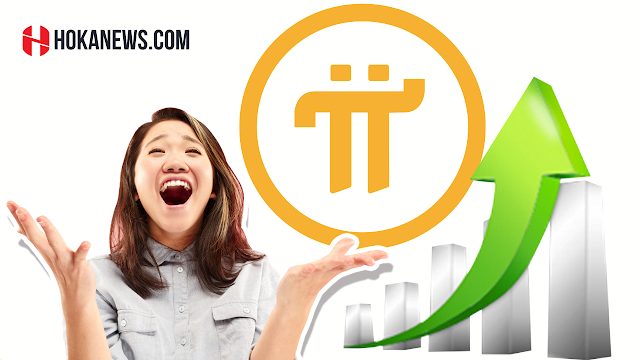JUST IN: Pi Network and the Decentralized Economy: The Role of Users in Project Success - hokanews
hokanews.com - In the ever-changing digital era, there are innovations that are redefining the way we interact with finance and the economy. One of the latest innovations to steal the spotlight is Pi Network, a mobile mining blockchain project that aims to create a decentralized economy that actively engages users.
When we discuss a decentralized economy, the role of the user is at the heart of success. Pi Network understands the importance of this and has designed a system that inspires active user participation.
Pi Network relies on users to maintain network security. This is done through a transaction validation process that requires user involvement. By performing certain tasks, users ensure the integrity of the network, which is very important in a decentralized ecosystem.
Apart from securing the network, users also play a role in building the community. Pi Network encourages users to invite others to join, expand the network, and spread understanding of the decentralized economy. A thriving community is a key indicator of Pi Network's success.
Pi Network applies a democratic approach to decision making. Users have the opportunity to provide input and a voice in the changes and development of this ecosystem. Decisions made involve users directly, creating a strong sense of ownership and commitment.
Pi Network Native Currency
Pi Network's native currency is an integral part of this ecosystem. Users not only play a role in network security, but also use Pi as a means of payment in transactions in the Pi Network community. These currencies help drive decentralized economies and provide value to participants.
Pi Network's Approach To Sustainable Growth
The project has a strong commitment to sustainable growth. By actively engaging users, Pi Network aims to maintain healthy economic growth and not rely solely on speculation. This approach reduces the volatility often associated with other cryptocurrencies.
The Future of a Decentralized Economy
In an increasingly decentralized ecosystem, Pi Network has created an inspiring example of how a community of users can be a driving force for change. Users are not only consumers, but also active stakeholders in shaping their own economies.
Nevertheless, challenges still exist. Developments like the Pi Network are still in their infancy, and various technical and regulatory obstacles must be overcome. Nonetheless, the vision of a more inclusive and equitable decentralized economy is on an interesting journey.
Although the vision of a decentralized economy is attractive, Pi Network and similar projects still have to face a number of challenges. One of them is the growing regulatory problem. Regulators in various countries are starting to pay attention to cryptocurrencies and blockchain projects, looking for ways to address the potential risks involved.
Pi Network, to meet these challenges, has taken a proactive approach to comply with applicable regulations. They are committed to cooperating with financial authorities and ensuring that Pi Network's native currency meets relevant guidelines.
Apart from that, technical obstacles also need to be overcome. The development of blockchain technology and network security is an integral part of the growth of this ecosystem. Pi Network must continue to develop and improve its infrastructure to maintain network stability and security.
Supporting a Sustainable Economy
Sustainable growth is a key element in Pi Network's vision. By involving users as network stewards and community builders, the project seeks to keep its economy from relying solely on speculation on its value. This approach minimizes the volatility often associated with other cryptocurrencies.
Pi Network has also introduced the concept of various tools and services that can be used with Pi's native currency. This includes banking services, online transactions, to trading platforms and the exchange of goods and services. All of this aims to provide value and utility to Pi's native currency, keeping its economy active and sustainable.
The Pi Core Team has developed a decentralized community/new country without a centralized governance (but a solid and secured structure) to aid safe and sustainable trading ecosystem complete with its native currency it's our duty to sustain and build our community and its value… pic.twitter.com/XeWt2oCYVZ
— Gett (@GettPay) September 9, 2023
The Future of a Decentralized Economy
In an increasingly decentralized ecosystem, Pi Network has created an inspiring example of how a community of users can be a driving force for change. Users are not only consumers, but also active stakeholders in shaping their own economies.
Nevertheless, challenges still exist. Developments like the Pi Network are still in their infancy, and various technical and regulatory obstacles must be overcome. Nonetheless, the vision of a more inclusive and equitable decentralized economy is on an interesting journey.
The importance of the user's role in the success of the Pi Network has become a major focus. Users are not only recipients of cryptocurrency, but also network security monitors, active community builders, and decision makers in ecosystem development. As such, Pi Network has provided a powerful example of how a decentralized economy should work.
Pi Network's native currency is also an important element in this ecosystem. Users use Pi as a means of payment in various transactions across the Pi Network community, providing value and utility to the currency and spurring sustainable economic growth.
While there are a number of challenges to overcome, such as evolving regulations and technical obstacles, hope for a more inclusive and equitable decentralized economic future remains bright. Pi Network and similar projects continue to develop their vision, with the belief that the user community is the force driving positive change in the way we interact with finance.
Pi Network and similar projects show how blockchain technology and cryptocurrencies are not only changing financial transactions, but also democratizing access to the economy. This vision of a decentralized economy is on an exciting journey, and its future will be determined by user commitment and ever-growing innovation. In a decentralized economy, the role of the user is key to redefining the way we participate in finance and exchange value.


